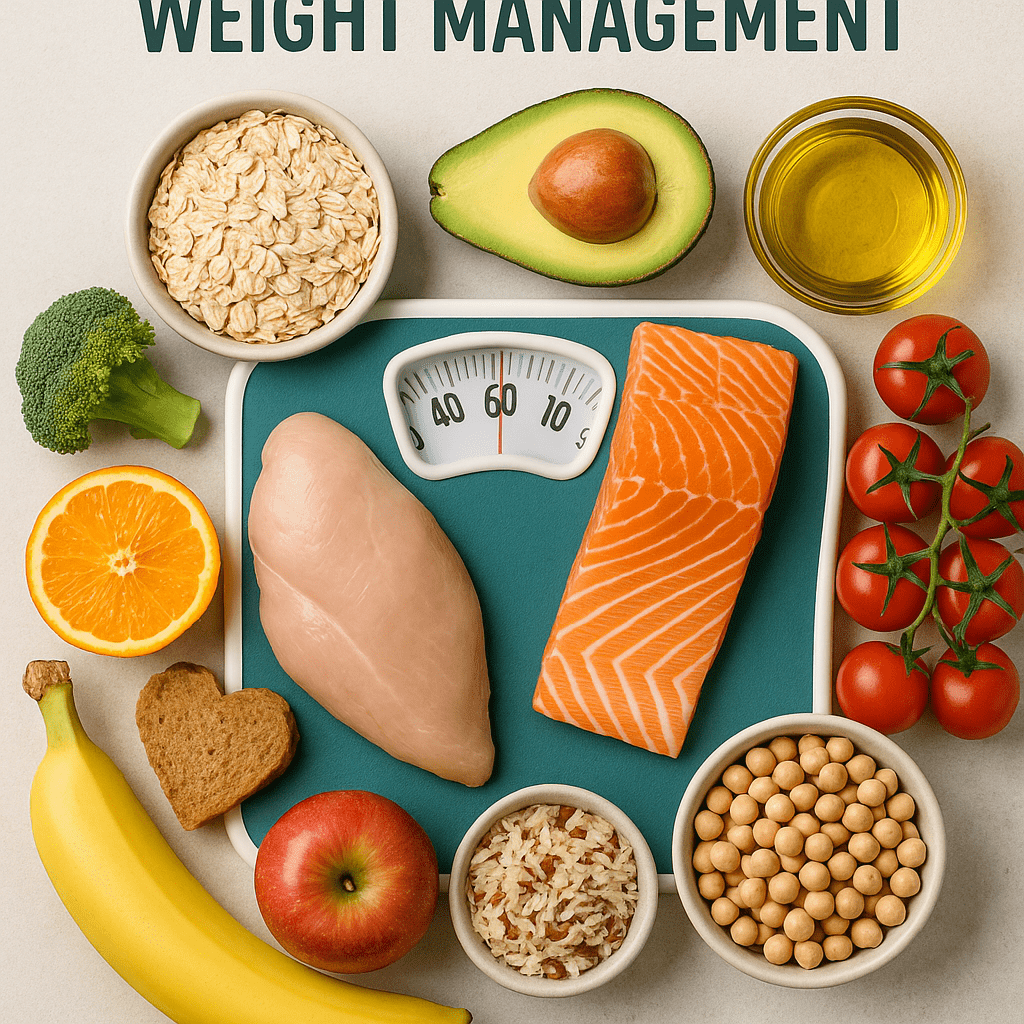Weight loss can be a complicated process, full of myths and misconceptions. Most people try to lose weight quickly by resorting to crash diets or unhealthy methods, but such measures usually only yield short-term results. The truth is that effective and long-term weight loss depends on forming simple, yet consistent habits in your daily life.
In this article, we will discuss 10 science-based and easy-to-implement ways to help you achieve and maintain a healthy weight. You will learn about calorie balance, the principles of proper nutrition, the importance of physical activity, sleep quality and other important aspects that will help you change your lifestyle towards a healthier weight.
Understand calorie balance
In order to lose weight effectively, it is necessary to understand the principle of calorie balance. A calorie deficit is a state where you consume fewer calories than you burn, and is the main mechanism for weight loss.
However, it is important to remember that a calorie deficit must be reasonable and moderate. Drastically cutting calories can slow your metabolism and cause muscle loss. Researchers recommend aiming for a 500-750 calorie deficit per day, which will allow you to lose about 0.5-1 kg per week – a safe and sustainable pace.
To track your calorie balance, you can:

- use a food diary or mobile apps to track your diet
- learn to recognize portion sizes
- plan your meals in advance
- weigh your food regularly until you learn to estimate portion sizes “by eye”
It is important to remember that a calorie deficit should be balanced with adequate nutrient intake. Even when reducing calories, you need to ensure that your body gets enough protein, vitamins and minerals to function normally.
Prioritize protein and fiber
Protein is one of the most important nutrients in the weight loss process. Not only does it help preserve muscle mass, but it also provides a long-lasting feeling of satiety, so you naturally eat less.
Studies show that a diet rich in protein can speed up metabolism and increase energy expenditure. Try to include quality protein sources in every meal:
- lean meats (chicken, turkey)
- fish and seafood
- eggs
- dairy products (Greek yogurt, cottage cheese)
- legumes (beans, lentils, chickpeas)
- nuts and seeds
Fiber also plays an important role in the weight loss process. It helps you feel fuller for longer, stabilizes blood sugar levels, and improves digestion. Fiber is abundant in:
- vegetables and fruits
- whole grains
- legumes
- nuts and seeds
If you have trouble getting enough protein or fiber from your daily diet, you can use quality dietary supplements to help supplement your diet. You can consider weight management supplements to help you balance your diet more easily.
Reduce your intake of processed sugars and refined carbohydrates
Processed sugars and refined carbohydrates are some of the biggest obstacles to weight loss. These foods quickly raise blood sugar levels, causing insulin spikes and ultimately, increased hunger and sugar cravings.
Processed foods are often low in nutritional value but high in calories, making them easy to overeat. Try to reduce your intake of:
- white flour products (white bread, rolls, cakes)
- sweetened drinks and juices
- candy and chocolate
- fast food
- most store-bought snacks
Instead, choose nutritious alternatives:

- whole grain products (rye bread, oatmeal, brown rice)
- natural sources of sweeteners (fruits, berries, small amounts of honey)
- homemade snacks from healthy products
Pay attention to food labels – sugar is often hidden under various names, such as glucose, fructose, maltose, dextrose or syrups. Proper gut health is also important in controlling sugar cravings – a healthy gut microbiota can help reduce cravings for unhealthy snacks. You can learn more about this by reading about supplements for digestion and the gut.
Drink enough water
Proper hydration is an often undeservedly forgotten, but very important aspect of weight control. Water is not only necessary for vital body processes, but can also significantly help in weight control.
Drinking water before meals reduces the likelihood of overeating. Studies show that drinking 500 ml of water before a meal can help you consume fewer calories and increase your metabolism by 24-30% for the next 1-1.5 hours. In addition, thirst is often interpreted by the body as hunger, so adequate fluid intake can reduce unnecessary snacking.
Practical tips for water consumption:
- Start your day with a glass of water as soon as you wake up
- Carry a water bottle everywhere you go
- Set reminders on your phone to drink water
- Enliven your water with lemon, green tea, cucumber or mint leaves
- Drink a glass of water before each meal and snack
- Replace sweetened drinks with water or unsweetened tea
It is recommended to drink at least 8 glasses (about 2 liters) of water per day, but the exact amount depends on your body weight, physical activity level and climatic conditions. The rule of drinking when you feel thirsty often works, but it may be too late during active exercise or on hot days.
Practice mindful eating
Mindful eating is about focusing your attention on your food and the process of eating. In today’s fast-paced world, we often eat automatically, while watching TV, browsing our phones, or working. This mindless eating often leads to overeating.
How to practice mindful eating:
- Eat without external distractions (TV, phone, computer)
- Chew your food thoroughly (at least 20-30 times each bite)
- Notice the taste, texture, and smell of your food
- Listen to your body’s signals about hunger and fullness
- Use smaller plates for portion control
- Eat slowly – meals should last at least 20 minutes, as this is how long it takes for the satiety signal to reach the brain
It is also important to learn to distinguish emotional hunger from physical hunger. Emotional hunger often comes on suddenly, is specific to certain foods (usually sweets or “comfort foods”), and does not go away even after eating. Physical hunger comes on gradually, can be satisfied with a variety of foods, and goes away when you are full.
Try to create a positive atmosphere during meals – set the table beautifully, enjoy your food, and, if possible, eat with family or friends. Studies show that people who regularly eat with others are less likely to have problems with excess weight.
Include regular physical activity
Physical activity is an integral part of healthy weight loss.

Regular exercise not only increases calorie burning, but also improves mood, strengthens the cardiovascular system and helps maintain muscle mass.
An ideal physical activity plan should combine cardio exercises with strength training:
- cardio exercises (walking, running, swimming, cycling) – at least 150 minutes of moderate-intensity exercise per week
- strength training (lifting weights, performing exercises with your own body weight) – 2-3 times a week
- high-intensity interval training (HIIT) – 1-2 times a week
- increasing daily activity (climbing the stairs, walking during your lunch break, cleaning the house)
The most important thing is to find a form of physical activity that you enjoy – this will make it easier to maintain motivation in the long term. Start with a small amount of activity and gradually increase the intensity and duration.
The appropriate use of nutritional supplements can help optimize your energy levels and support muscle recovery after training. If you want additional support for your metabolism and energy levels, you can look into supplements designed to support energy and metabolism.
Get quality sleep
Sleep is one of the most undeservedly overlooked aspects of weight management. Insufficient sleep directly affects the balance of hormones that regulate hunger and satiety – it reduces the amount of leptin (the satiety hormone) and increases the amount of ghrelin (the hunger hormone).
Without enough quality sleep, the body:
- feels more hungry, especially a strong desire to consume carbohydrates and sugar
- has less energy for physical activity
- experiences higher levels of the stress hormone cortisol, which promotes the accumulation of belly fat
- has weaker willpower control over food choices
How to improve sleep quality:

- maintain a consistent sleep schedule (go to bed and get up at the same time)
- create a calm sleep environment (dark, quiet, cool)
- avoid screens (phones, computers, TV) at least an hour before bed
- limit caffeine intake in the afternoon
- relax before bed (read a book, practice meditation, do relaxation exercises)
- avoid heavy meals and alcohol before bed
It is recommended that most adults get 7-9 hours of sleep per night. Monitor your well-being and energy levels – if you feel rested and refreshed, you are probably getting enough sleep.
Manage stress and emotional eating triggers
Stress and emotions often become the cause of overeating or irrational food choices. Long-term stress increases cortisol levels, which stimulates appetite and the desire to eat high-calorie foods, especially sweets and fatty foods.
To control emotional eating, it is important to:
- recognize your emotional eating triggers (boredom, anxiety, fatigue, sadness)
- learn alternative stress management techniques (physical activity, meditation, deep breathing exercises)
- practice self-reflection and keep a diary about the connections between food consumption and emotions
- find enjoyable activities that are not related to food (hobbies, social interaction)
- seek help from specialists (psychologist, nutritionist) if emotional eating becomes uncontrollable
Mindfulness practices can be particularly useful – they help create a pause between emotional impulse and action, allowing you to consciously choose how to respond to stress or negative emotions.
Social support also plays an important role – share your goals and challenges with loved ones who can provide emotional support without pressure. Some people find it helpful to join support groups, where you can share experiences with people with similar goals.
Set realistic goals and plan for relapses
Healthy weight loss is a marathon, not a sprint. It is impossible and unhealthy to try to change all your habits at once or to achieve drastic results in a short period of time.
For effective goal setting:
- Set SMART goals (specific, measurable, attainable, realistic, time-bound)
- Break down your big goals into smaller, more achievable milestones
- Track your progress, but don’t obsessively (weigh yourself no more than once a week, at the same time)
- Focus on process goals (e.g., “I will eat vegetables 5 days a week”) instead of outcome goals (e.g., “I will lose 5 kg”)
Relapses and unusual events are a normal part of the weight loss process. Instead of blaming yourself for your imperfections:
- Practice self-acceptance and self-compassion
- Learn from your mistakes – analyze what caused you to deviate from your plan
- Return to your plan after a deviation, without waiting for the “perfect opportunity” or Monday
- Use the “80/20 rule” – try to stick to your plan 80% of the time, and allow yourself flexibility 20%
A healthy rate of weight loss is 0.5-1 kg per week. More weight loss may mean loss of muscle, not fat, and is often not sustainable in the long term.
Reach for social support and celebrate your successes
Losing weight can be a challenge, so a support system can be key to your success. Research shows that people who have social support are more likely to achieve and maintain their weight loss goals.
How to create an effective support system:
- Share your goals with trusted family members or friends
- Find a group of like-minded people (in person or online) with similar goals
- Consider working with a personal trainer or nutritionist
- Join fitness challenges or programs that encourage accountability
- Find sources of motivation (role models, books, podcasts)
It’s important to not only have support, but also to celebrate your successes. Recognize and reward yourself for your achievements, even small ones:
Set not only final goals but also milestones so you can experience success more often
Create a reward system that is not related to food (new clothes, a massage, a trip)
Keep a journal of achievements where you record all the positive changes, not just the number on the scale
Pay attention to the invisible successes (better well-being, more energy, better sleep quality)
Some herbal supplements can help support your weight management journey. For example, berberine and weight management is an area of extensive research, and this herbal extract may have a positive effect on metabolism.
Weight loss should not only be about changes in appearance, but also about improved health and quality of life. Every step towards a healthier lifestyle is worth recognizing and celebrating.
Conclusion
Effective weight loss does not require drastic measures or complicated diets. Simple but consistent changes in daily life often work best. A balanced approach to nutrition, regular physical activity, quality sleep and stress management are the main pillars that help you achieve and maintain a healthy weight.
Remember that every body is unique, so what works for one person may not work for another. It is important to listen to your body’s signals, experiment and find the strategies that work best for you.
Start by implementing a few tips and gradually incorporate more healthy habits. Be patient with yourself – long-term results take time. The key is consistency, not perfection.
If you are looking for additional support on your weight loss journey, it is also worth considering natural ways to support your metabolism. For example, resveratrol and metabolic support can be a useful additional element in your weight management strategy.
Frequently Asked Questions
How quickly can I expect to lose weight safely?
Most people can safely and healthily lose 0.5-1 kg per week. This is considered a sustainable rate that allows you to maintain muscle mass and reduces the risk of weight regain.
Are supplements necessary for weight loss?
Supplements are not necessary for weight loss, but some can help support metabolism or reduce appetite. It is always a good idea to consult a specialist before starting any supplements.
Why is protein important for weight loss?
Protein helps maintain muscle mass during weight loss, keeps you feeling fuller longer, and requires more energy to digest than other nutrients, thus increasing calorie intake.
Does walking really help with weight control?
Yes, regular walking burns calories, supports heart health, and is one of the easiest ways to increase your daily physical activity. Walking for 30-60 minutes every day can make a significant contribution to weight control.
What to do if your weight loss stops?
When you hit a plateau, you should reevaluate your calorie intake, adjust your exercise regimen, pay attention to your sleep quality and stress management, and seek professional help if necessary.

